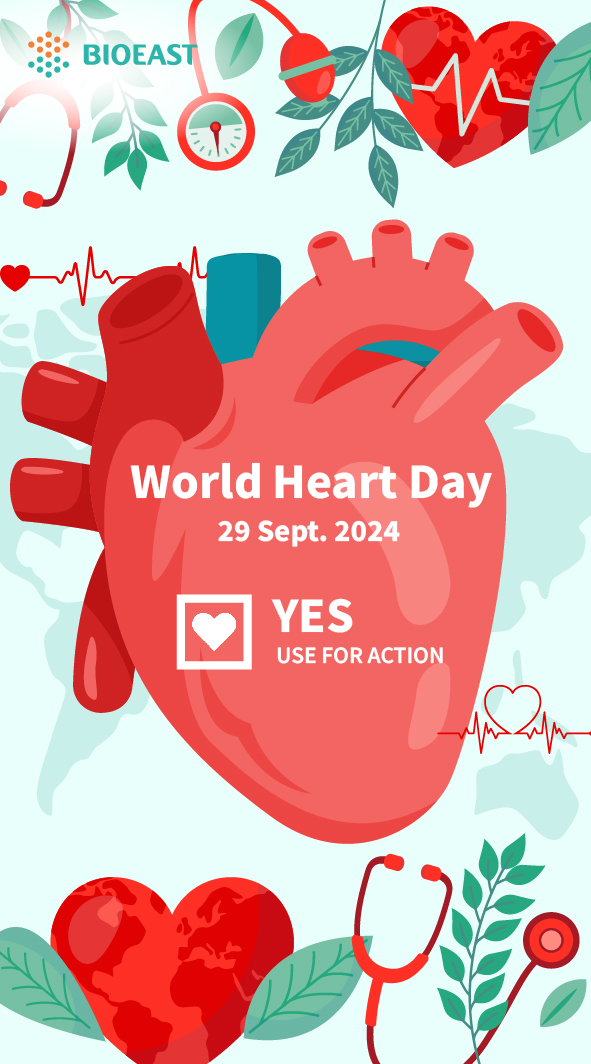News & Blogs 2024-09-29
World Heart Day 2024

EN
CN
EN
News & Blogs 2024-09-29
World Heart Day 2024

According to the World Heart Federation, cardiovascular disease (CVD) is responsible for over 20.5 million deaths annually, making it one of the leading causes of mortality worldwide. Despite its high prevalence, many individuals are unaware of the risk factors associated with CVD, resulting in low diagnosis, treatment, and control rates. Given the severe health impact and economic burden of CVD, it is crucial to adopt preventive measures and promote awareness of heart health.
A healthy lifestyle can significantly reduce the risk of cardiovascular disease. Key recommendations include:
●Balanced Diet: Consuming a diet rich in fruits, vegetables, whole grains, and lean proteins.
●Regular Physical Activity: Engaging in moderate exercise to maintain cardiovascular fitness.
●Weight Management: Maintaining a healthy weight to prevent strain on the heart.
●Smoking Cessation: Avoiding tobacco products to reduce the risk of heart disease.
●Moderate Alcohol Consumption: Limiting alcohol intake to protect heart health.
●Healthy Sleep Patterns: Ensuring adequate and quality sleep to reduce cardiovascular stress.
●Mental Well-being: Managing stress and maintaining a positive outlook to improve overall heart health.
Early screening and monitoring of cardiovascular risk factors, particularly in high-risk populations, are essential to reducing the incidence of CVD. Blood-based biomarkers have become valuable tools for assessing the risk of heart disease, enabling early diagnosis and intervention.
●cTnI and cTnT (Troponin I and T): These are the most sensitive and specific markers for detecting myocardial injury. Troponins are considered the "gold standard" for diagnosing acute myocardial infarction (AMI).
●MYO (Myoglobin): Known for its rapid response, MYO is an early indicator of AMI, showing elevated levels 1-2 hours after myocardial damage. It is highly sensitive and helps in monitoring treatment efficacy.
●CK-MB (Creatine Kinase-MB): Once regarded as the gold standard for AMI diagnosis in the 1980s, CK-MB remains useful for identifying reinfarction with good sensitivity and specificity.
●HFABP (Heart-type Fatty Acid Binding Protein): Another early marker for AMI, HFABP rises 1-2 hours post-event and provides more specificity than MYO.
●BNP/NT-proBNP: These are the primary biomarkers for screening and diagnosing heart failure. They are also used for assessing the severity and prognosis of heart failure.
●ST2: This marker increases when the heart undergoes mechanical stress, further contributing to heart damage. It plays a significant role in diagnosing, treating, and predicting the risks for heart disease patients.
The fight against cardiovascular disease requires a comprehensive approach that includes promoting healthy lifestyles, increasing awareness, and improving early detection methods. With advancements in cardiac biomarker testing, we can now diagnose and intervene earlier, reducing the overall burden of CVD and improving patient outcomes. Let's take action to protect heart health and prevent the progression of this global disease.
By understanding these crucial risk factors and taking proactive steps, individuals and healthcare systems can work together to mitigate the devastating impact of cardiovascular diseases.
| Product Series | Product Name | Abbr. | Cat No. | Type | Source | Application Platform | Pair Recommendation |
| Cardiac Series | Cardiac Troponin I | cTnI | cTnI101 | Monoclonal Antibody | Mouse | LF,CLIA,EIA | Coating |
| cTnI102 | Monoclonal Antibody | Mouse | LF,CLIA,EIA | Conjugate | |||
| cTnI103 | Monoclonal Antibody | Mouse | LF,CLIA,EIA | Coating | |||
| cTnI104 | Monoclonal Antibody | Mouse | LF,CLIA,EIA | Conjugate | |||
| cTnI105 | Monoclonal Antibody | Mouse | LF,CLIA,EIA | Coating | |||
| cTnI106 | Monoclonal Antibody | Rabbit | LF,CLIA,EIA | Coating | |||
| cTnI301 | Recombinant Antigen | E.coli | LF,CLIA,EIA | Control | |||
| Cardiac Troponin I-Cardiac Troponin C | cTnI-TnC | cTnI-TnC311 | Recombinant Antigen | E.coil | LF,CLIA,EIA | Control | |
| cTnI-TnC301 | Recombinant Antigen | E.coli | LF,CLIA,EIA | Control | |||
| Cardiac Troponin T | cTnT | cTnT101 | Monoclonal Antibody | Mouse | LF,CLIA,EIA | Conjugate/Coating | |
| cTnT102 | Monoclonal Antibody | Mouse | LF,CLIA,EIA | Coating/Conjugate | |||
| Heart Fatty Acid Binding Protein | H-FABP | H-FABP101 | Monoclonal Antibody | Mouse | LF,CLIA,EIA | Coating | |
| H-FABP102 | Monoclonal Antibody | Mouse | LF,CLIA,EIA | Conjugate | |||
| H-FABP103 | Monoclonal Antibody | Mouse | LF,CLIA,EIA | Coating | |||
| H-FABP301 | Recombinant Antigen | E.coli | LF,CLIA,EIA | Control | |||
| NT-proB-type Natriuretic Peptide | NT-proBNP | NT-proBNP101 | Monoclonal Antibody | Sheep | LF,CLIA,EIA | Coating | |
| NT-proBNP102 | Monoclonal Antibody | Mouse | LF,CLIA,EIA | Conjugate | |||
| NT-proBNP103 | Monoclonal Antibody | Mouse | LF,CLIA,EIA | Conjugate | |||
| NT-proBNP301 | Recombinant Antigen | E.coil | LF,CLIA,EIA | Control | |||
| NT-proBNP302 | Recombinant Antigen | HEK293 | LF,CLIA,EIA | Control | |||
| B-type Natriuretic Peptide | BNP | BNP103 | Monoclonal Antibody | Mouse | LF,CLIA,EIA | Coating | |
| BNP105 | Monoclonal Antibody | Sheep | LF,CLIA,EIA | Conjugate | |||
| BNP106 | Monoclonal Antibody | Sheep | LF,CLIA,EIA | Coating | |||
| proBNP302 | Recombinant Antigen | HEK293 | LF,CLIA,EIA | Control | |||
| Myoglobin | MYO | MYO101 | Monoclonal Antibody | Mouse | LF,CLIA,EIA | Coating | |
| MYO102 | Monoclonal Antibody | Mouse | LF,CLIA,EIA | Conjugate | |||
| MYO303 | Native Antigen | / | LF,CLIA,EIA | Control | |||
| Creatine kinase MB | CK-MB | CKMB101 | Monoclonal Antibody | Mouse | LF,CLIA,EIA | Coating | |
| CKMB102 | Monoclonal Antibody | Mouse | LF,CLIA,EIA | Conjugate | |||
| CKMB103 | Monoclonal Antibody | Mouse | LF,CLIA,EIA | Conjugate | |||
| CKMB104 | Monoclonal Antibody | Mouse | LF,CLIA,EIA | Coating | |||
| CKMB311 | Recombinant Antigen | E.coil | LF,CLIA,EIA | Control | |||
| Suppression of Tumorigenicity 2 | ST2 | ST2101 | Monoclonal Antibody | Mouse | LF,CLIA,EIA | Coating | |
| ST2102 | Monoclonal Antibody | Mouse | LF,CLIA,EIA | Conjugate | |||
| ST2103 | Monoclonal Antibody | Mouse | LF,CLIA,EIA | Coating | |||
| ST2302 | Recombinant Antigen | HEK293 | LF,CLIA,EIA | Control |